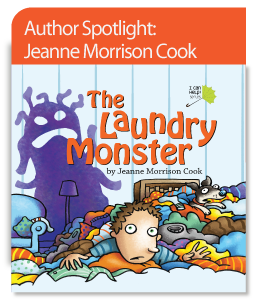A Load of Success for Author Jeanne Morrison Cook
 Wednesday, March 23, 2011 at 8:13AM | in
Wednesday, March 23, 2011 at 8:13AM | in  Children's Literature,
Children's Literature,  Publishing Industry,
Publishing Industry,  Writing Tips
Writing Tips Jeanne Morrison Cook is a mother of four who tries to keep the tornado that is her home tamed to a minor storm. And now she's doing such as a successful author with her recently released children's book, The Laundry Monster. The concept for The Laundry Monster came after she tripped over a pile of laundry and felt like she was going to be consumed into the abyss. After that incident she decided it was time for her children to learn in a whimsical manner how to help with household chores.
This adorable book for children was created with an energetic romping, rhyming vocabulary. As the first in The I Can Help! series developed by Jeanne Morrison Cook, it takes aim at teaching children valuable lessons about helping out with a common household chore.
 Jeanne's success with her book has earned her a place in the Book Bridge Press Author Spotlight. When we talked with Jeanne about her experience creating The Laundry Monster, we asked her to tell us about her initial vision for her story as it related to the production of her book, and here's what she said:
Jeanne's success with her book has earned her a place in the Book Bridge Press Author Spotlight. When we talked with Jeanne about her experience creating The Laundry Monster, we asked her to tell us about her initial vision for her story as it related to the production of her book, and here's what she said:
Book Bridge Press coached me and helped me move forward. They were meticulous, and helped me see the areas of my story that were essential to its success and which parts could be cut. When I first met with BBP, they asked me about my goals. My number one goal was to produce the best book possible. Through their expert editing, publishing illustration support and graphic design expertise, I exceeded my own expectations. BBP also encouraged me to be my own boss and start my own publishing company instead of working through a self-publishing third party.
We appreciate Jeanne's kind words, and her dedication to making certain that all aspects of her book exemplified quality production and creative vision. We think Jeanne and her book is a wonderful example for all indepedent authors. You can read more about her and The Laundry Monster in The Author Spotlight.




